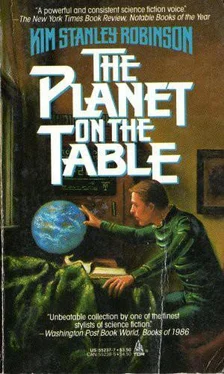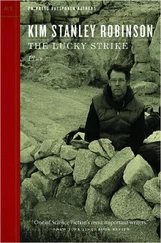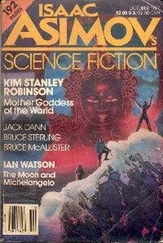Now he was beside the wreck of Burano. Against the black sky he could see only the drunken campanile, and suddenly he realized why he hated the sight of this abandoned town: it was a vision of the Venice to come, a cruel model of the future. If the water level rose even three meters, Venice would become nothing but a big Burano. Even if the water didn’t rise, more people were leaving Venice every year… One day it would be empty. Once again the sadness he had felt looking at the Teotaca filled him, a sadness become a bottomless despair. “God damn it,” he said, staring at the crippled campanile; but that wasn’t enough. He didn’t know words that were enough. “God damn it.”
Just beyond Burano the squall hit. It almost blew the sail out of his hand; he had to hold on with a fierce clench, tie it to the stem, tie the tiller in place, and scramble over the pitching canvas deck to lower the sail, cursing all the while. He brought the sail down to its last reefing, which left a handkerchief-sized patch exposed to the wind. Even so, the boat yanked over the waves and the mast creaked as if it would tear loose… The choppy waves had become white caps, in the screaming wind their tops were tearing loose and flying through the air, white foam in the blackness…
Best to head for Murano for refuge, Carlo thought. Then the rain started. It was colder than the Lagoon water and fell almost horizontally. The wind was still picking up. His handkerchief sail was going to pull the mast out. “Madonna,” he said. He got onto the decking again, slid up to the mast, took down the sail with cold and disobedient fingers. He crawled back to his hole in the deck, hanging on desperately as the boat yawed. It was almost broadside to the waves and hastily he grabbed the tiller and pulled it around, just in time to meet a large wave stern-on. He shuddered with relief. Each wave seemed bigger than the last; they picked up quickly on the Lagoon. Well, he thought, what now? Get out the oars? No, that wouldn’t do; he had to keep stern-on to the waves, and besides, he couldn’t row effectively in this chop. He had to go where the waves were going, he realized; and if they missed Murano and Venice, that meant the Adriatic.
As the waves lifted and dropped him, he grimly contemplated the thought. His mast alone acted like a sail in a wind of this force; and the wind seemed to be blowing from a bit to the west of north. The waves—the biggest he had ever seen on the Lagoon, perhaps the biggest ever on the Lagoon—pushed in about the same direction as the wind, naturally. Well, that meant he would miss Venice, which was directly south, maybe even a touch west of south. Damn, he thought. And all because he had been angered by those two Japanese and the Teotaca. What did he care what happened to a sunken mosaic from Torcello? He had helped foreigners find and cart off the one bronze horse of San Marco that had fallen… more than one of the stone lions of Venice, symbol of the city… the entire Bridge of Sighs, for Christ’s sake! What had come over him? Why should he have cared about a forgotten mosaic?
Well, he had done it; and here he was. No altering it. Each wave lifted his boat stern first and slid under it until he could look down m the trough, if he cared to, and see his mast nearly horizontal, until he rose over the broken, foaming crest, each one of which seemed to want to break down his little hole in the decking and swamp him—for a second he was in midair, the tiller free and useless until he crashed into the next trough. Every time at the top he thought, this wave will catch us, and so even though he was wet and the wind and rain were cold, the repeated spurts of fear adrenaline and his thick wool coat kept him warm. A hundred waves or so served to convince him that the next one would probably slide under him as safely as the last, and he relaxed a bit. Nothing to do but wait it out, keep the boat exactly stern-on to the swell… and he would be all right. Sure, he thought, he would just ride these waves across the Adriatic to Trieste or Rijeka, one of those two tawdry towns that had replaced Venice as Queen of the Adriatic… the princesses of the Adriatic, so to speak, and two little sluts they were, too… Or ride the storm out, turn around, and sail back in, better yet. …
On the other hand, the Lido had become a sort of reef, in most places, and waves of this size would break over it, capsizing him for sure. And, to be realistic, the top of the Adriatic was wide. Just one mistake on the top of these waves (and he couldn’t go on forever) and he would be broached, capsized, and rolled down to join all the other Venetians who had ended up on the bottom of the Adriatic. And all because of that damn Madonna. Carlo sat crouched in the stern, adjusting the tiller for the particulars of each wave, ignoring all else in the howling, black, horizonless chaos of water and air around him, pleased in a grim way that he was sailing to his death with such perfect seamanship. But he kept the Lido out of mind.
And so he sailed on, losing track of time as one does when there is no spatial referent. Wave after wave after wave. A little water collected at the bottom of his boat, and his spirits sank. That was no way to go, to have the boat sink by degrees under him…
Then the high-pitched, airy howl of the wind was joined by a low booming, a bass roar. He looked over his shoulder in the direction he was being driven and saw a white line, stretching from left to right; his heart jumped, fear exploded through him. This was it. The Lido, now a barrier reef tripping the waves. They were smashing down on it, he could see white sheets bouncing skyward and blowing to nothing. He was terrifically frightened. It would have been so much easier to founder at sea.
But there—among the white breakers, off to the right—a gray finger pointing up at the black—
A campanile. Carlo was forced to look back at the wave he was under, to straighten the boat, but when he looked back it was still there. A campanile, standing there like a dead lighthouse. “Jesus!” he said aloud. It looked as if the waves were pushing him a couple hundred meters to the north of it. As each wave lifted him he had a moment when the boat was sliding down the face of the wave as fast as it was moving under him; during these moments he shifted the tiller a bit and the boat turned and surfed across the face, to the south, until the wave rose up under him to the crest, and he had to straighten it out. He repeated the delicate operation time after time, sometimes nearly broaching the boat in his impatience. But that wouldn’t do—just take as much from each wave as it will give you, he thought. And pray it will add up to enough.
The Lido got closer, and it looked as if he was directly upwind of the campanile. It was the one at the Lido channel entrance, or perhaps the one at Pellestrina, farther south; he had no way of knowing, and at the moment didn’t care. He was just happy that his ancestors had seen fit to construct such solid bell towers. In between waves he reached under the decking and by touch found his boat hook and the length of rope he carried. It was going to be a problem, actually, when he got to the campanile—it would not do to pass it helplessly by a few meters. On the other hand he couldn’t smash into it and expect to survive either, not in these waves. In fact the more he considered it, the more exact and difficult he realized the approach would have to be, and fearfully he stopped thinking about it and concentrated on the waves.
The last one was the biggest. As the boat slid down its face, the face got steeper, until it seemed they would be swept on by this wave forever. The campanile loomed ahead, big and black. Around it waves pitched over and broke with sharp, deadly booms; from behind Carlo could see the water sucked over the breaks, as if over short but infinitely broad waterfalls. The noise was tremendous. At the top of the wave it appeared he could jump in the campanile’s top windows—he got out the boat hook, shifted the tiller a touch, took a deep breath. Amid the roaring, the wave swept him just past the stone tower, smacking against it and splashing him; he pulled the tiller over hard, the boat shot into the wake of the campanile—he stood and swung the boat hook over a window casement above him. It caught, and he held on hard.
Читать дальше












